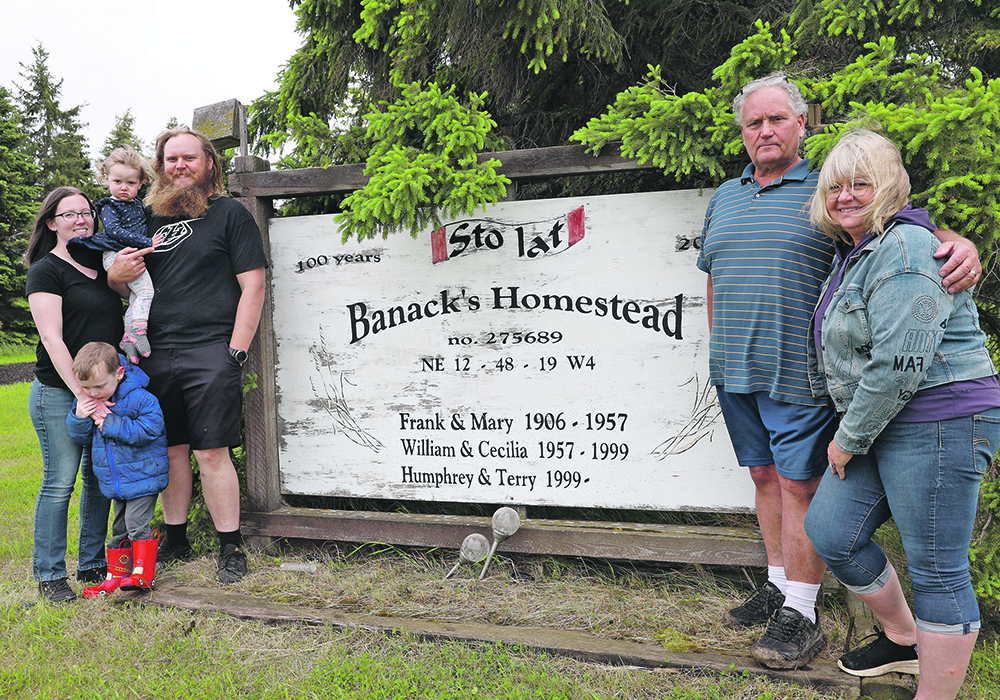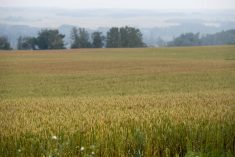Couple will pass the farm on to son and daughter-in-law but want to ensure non-farming daughters are treated fairly
ROUND HILL, Alta. — At the end of Humphrey and Terry Banack’s driveway is a large sign listing the names and dates of the previous Banack families who lived there since the farm was established in 1906.
The year 1999, when Terry and Humphrey started farming, is written on the sign, but there is no end date for their tenure. They are unsure when that date will be added, along with the names of their son, Nick, and daughter-in-law, Amanda. And that is OK.
At the moment, the four family members farm together, have a transition plan and written wills that outline their desires, and there is no hurry for Humphrey and Terry to officially retire and leave the farm.
Read Also

Vintage power on display at Saskatchewan tractor pull
At the Ag in Motion farm show held earlier this year near Langham, Sask., a vintage tractor pull event drew pretty significant crowds of show goers, who were mostly farmers.
Through meetings, discussions and documents, a plan is in place for Nick and Amanda to take over. It is also clear that Nick’s two sisters, not involved with the farm, will receive something as well.
“Through our wills, the girls know exactly where it stands. And Nick and Amanda understand what happens with the assets,” said Humphrey, as he sat at the kitchen table in the home where he and his siblings were raised.
“That is a challenge for Terry and I, to respect our daughters’ share in the family farm as we move forward. There is no equal way to do this. Fair is the only word you can use.
“We had discussions with our daughters as to where they fit into our retirement plans and the asset disposal when the time comes. Make sure you have those discussions. Don’t make surprises for anyone,” he said.
Open discussions with the entire family about the farm’s future, and talking to professionals — accountants, lawyers and farm succession plan experts — have all added pieces to the succession plan, said Terry.
“They are more paths than decisions. They are always changing, but the paths are getting set.”
Each one has affected the direction of the farm and Humphrey and Terry’s retirement. A near fatal car accident with Humphrey last year made the family realize the importance of an updated farm transition plan and the importance of its flexibility.
“Have a look at the long term, but the short term stuff has to be pretty flexible. Life happens and things change,” said Humphrey.
“The car accident could have changed this entire plan. One second difference could have changed everything. You have to make sure anything you devise is flexible enough to address this. None of the four of us are invincible. Make sure the plans are understood where they are at. That is where professionals can help.”
Nick grew up on the farm and worked with cattle, hogs and grain. His dozen years spent away from the farm, combined with changing technology, gave him a solid foundation in what is required to farm, but he is catching up on the latest technology and trends.
When the family meets with agronomists or marketing advisors, Nick said he tries to absorb as much as he can.
“I wouldn’t say I have a huge input in the meetings. I have a huge amount of absorption at the meetings. I am more of a sponge than a tap,” said Nick.
Part of the transition plan will eventually see Nick and Amanda’s farming partnership rolled into Terry and Humphrey’s corporation. This will be done when the lawyers and tax accountants decide it is the best time.
Adding to the complexity of this decision is a farming joint venture with Humphrey’s brother, Willie, and his son, Dan, and their families. Each farming unit farms 4,000 acres for a total of 8,000.
Each family unit has its own land and equipment, but shares expenses like fuel, agronomy and marketing experts and divides rental land equally. This group makes farming decisions at daily morning meetings.
“Whenever there is something like a seeding order, we discuss all of it, but run game time decisions through Willie. One guy makes the decision and we trust it is a good one instead of three guys making decisions. It is easier,” said Nick.
As Nick and Amanda gain their footing, they take on more responsibility and the farm transition plans change slightly, said Amanda, who grew up in a city outside Toronto and had to learn everything about farming. Their second date was on a combine.
“I don’t come from a farming background and had to put a lot of trust into what I was hearing and not understanding all of it,” she said.
“Seeing it all change over all of the years and not being so defensive about something I may not understand has been kind of the grace I am giving myself. Terry and Humphrey are so good at communicating and talking to us,” she said.
Terry and Humphrey always wanted a clear transition plan for their children. The farm purchase from her family was clear and straightforward, but that was not the case with Humphrey’s father.
“We were totally in the dark all the time if a transition would happen. There was a lot of uncertainty we put in God’s trust,” she said.
That past uncertainty solidified their view that a transparent plan was needed.
“That is probably why we are looking at this as important. With my dad, there weren’t these discussions. We never really knew what could happen,” said Humphrey.
“We have things set up better. The girls will see some of the land but the majority will stay with the farming operation to ensure its long-term viability.”
A decision 12 years ago that Nick would join the farm had an impact on the future. Without that, Humphrey said he and Terry would have been winding down the farm, not expanding it.
“If we didn’t have the next generation here, our farm wouldn’t look like it does. We wouldn’t be expanding, we wouldn’t be farming as much. We would be farther down the retirement road than we are.”
While daily decisions and farming transitions are important, ensuring the Banack family farm remains a welcome place for extended family is also important.
Last Thanksgiving, 76 family members ate their meal in the field. It is not uncommon for more than 50 friends and relatives to share an Easter meal at the farm.
Each renovation of the house is done with family in mind to respect its history. Stair railings built by Humphrey’s parents were left in place out of respect.
“I tenderly re-did pieces in the house gradually. That heritage is engrained in generations and generations,” said Terry, who wants to ensure every generation of Banacks feels welcome in the farmhouse.

















